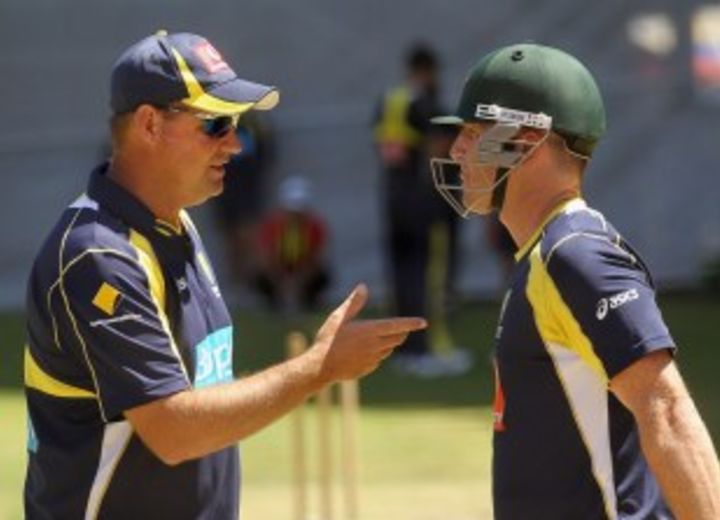Haddin gets the evil-villain approach
And Andrew Hughes remembers the exciting plot of the original Woolf Report

Wednesday, 1st February How do you let someone know that you’re not interested any more? That they are the leftover bit of pastry dough or the spare screw in the flat pack furniture set?
You could tell them bluntly that the spark has gone, that you don’t find their sledging thrills like it used to, that they can’t catch and that your mother never liked them. This can be painful; there may be tears, perhaps the odd bruise. But it’s the kindest way.
Option two is to take the little kernel of truth and wrap it in an awful lot of stuff that could plausibly be true, but on this occasion isn’t. It’s not you, Brad, it’s me. I’ve changed. I used to think that looking like Ian Healy and occasionally blasting a quick 50 was all I wanted in a keeper, but now I realise I was wrong. That kind of thing.
But John Inverarity has gone for option three - the evil villain approach. In this scenario, you enact the dumping but dress it up in the sort of vaguely sinister euphemisms best delivered by an od- looking man in an overstuffed leather armchair, stroking a cat.
“You have disappointed us, Mr Haddin. Perhaps you need a rest. Perhaps the schedule is beyond you. I am sorry that you have to leave us now. Kindly stand on the spot marked with an X and wait while I press the red button. Is it safe? Oh yes, perfectly safe, Mr Haddin, you won’t feel a thing.”
But Brad’s not buying it. He can see through the talk of gruelling schedules to the harsh reality beneath. He knows he hasn’t been rested and after Matthew Wade’s knock today, he may be even more dropped than he was yesterday.
If he has pulled on the saggy green for the last time, it will be a shame and possibly a season or two earlier than he’d hoped. Having taken the precaution of not being very good at sport, I’ve never found myself dropped from an international team, but I imagine it must feel a bit like someone tapping you on the shoulder in the middle of the most amazing party and telling you that you have to leave. A bit like life, really.
Thursday, 2nd February The Woolf Report is in today, continuing a family tradition of Woolfs taking the game’s governing body to task. It is well known that Virginia Woolf was a scathing critic of the Imperial Cricket Conference and regularly used to bore the rest of the Bloomsbury set with her long-winded diatribes about the state of the modern game, as this extract from Lytton Strachey’s diary attests:
“Afternoon tea with V.W. Banging on about the overcrowded fixture list and England having to play as many as eight Tests in a year. Made polite noises. Light-heartedly suggested she take interest in a more lady-like pastime. Did not go down well.”
Published in 1924, her first novel, The Woolf Report, was a tautly plotted administrative thriller based around the struggle of a minor MCC official called Victor Woolf as he sought to overhaul the antiquated filing system and reform the outdated Edwardian board meetings by instituting a revolutionary biscuit rota.
But the book did not go down well in literary circles. Her friend EM Forster told her that no one in their right mind would want to read administrative cricket fiction and that if that was the best she could come up with, she might as well go the whole hog and just write down any old thoughts that popped into her head. The following year she released Mrs Dalloway and her cricket writing career never recovered.
Sadly, this second Woolf Report is not a patch on the first. There is no plot to speak of, the dialogue is non-existent, there are very few sword fights and the characters, including a businessman who owns a cricket team, runs the national game and sits on the ICC board all at the same time, are frankly implausible. All in all, a bit of a disappointment. If you haven’t read it I’d wait for the movie.
Andrew Hughes is a writer currently based in England
Read in App
Elevate your reading experience on ESPNcricinfo App.